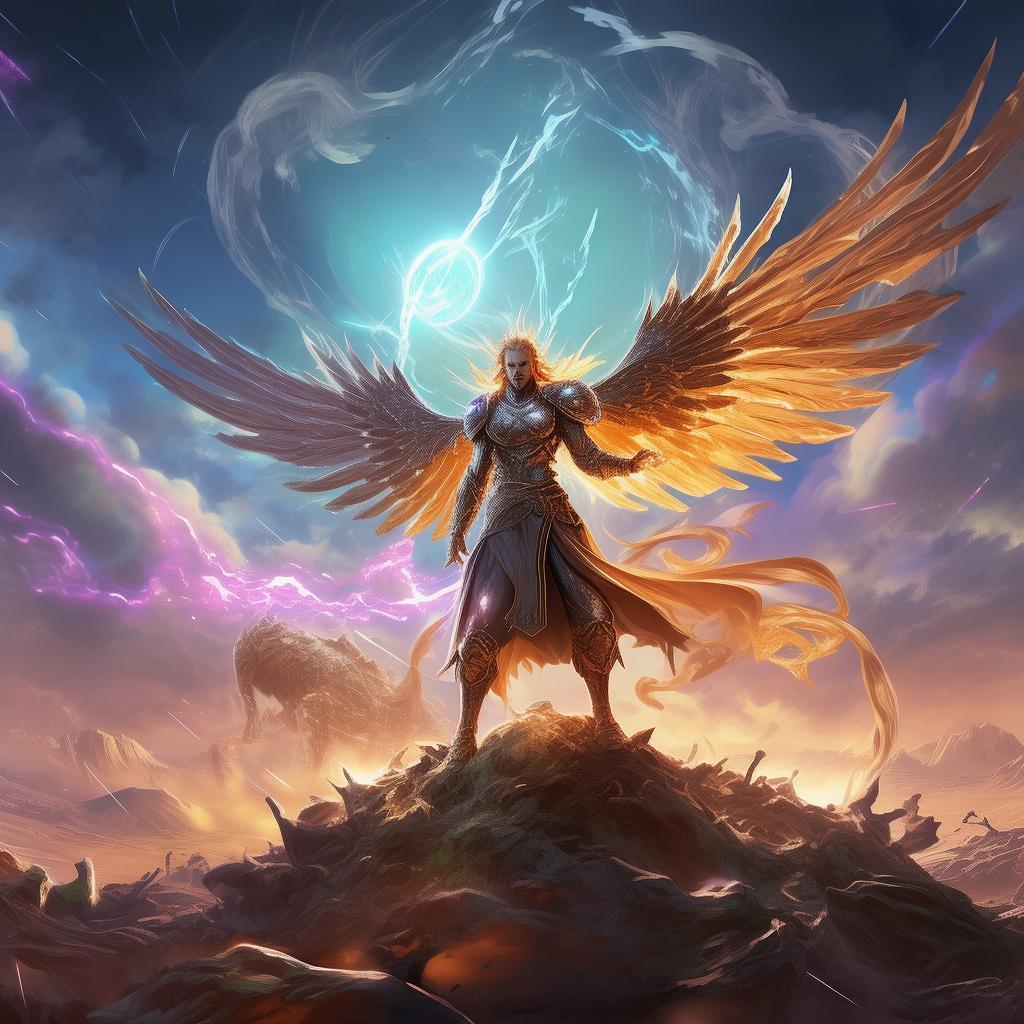The Starlit Symphony of the Deities: The Awakening of the Celestial Composer
In the realm of the gods, where celestial music weaves the very fabric of existence, there lived a composer named Wang Peng. His melodies were said to be the very essence of the cosmos, harmonizing the stars and planets in a symphony that was the envy of all deities. Yet, Wang Peng was not a deity himself; he was a mortal, a human who had been granted the divine gift of composition by the gods.
The Starlit Symphony of the Deities was a composition so ancient that it had been lost to time, a melody that was said to be the very heartbeat of the universe. It was said that when this symphony was played, it could either bring peace or chaos, life or death. It was a power that the gods themselves had long since forgotten, for it was a melody that could awaken the sleeping gods and reshape the very essence of reality.
Wang Peng, though mortal, had been chosen by fate to uncover this lost symphony. His journey began in the tranquil town of Celestia, a place where the mundane and the divine intertwined seamlessly. He was a humble musician, known for his simple melodies that brought joy to the hearts of all who heard them. But beneath his gentle exterior lay a burning desire to understand the mysteries of the cosmos.
One night, as Wang Peng was lost in thought, a vision came to him. The vision was of an ancient scroll, written in a language that was both beautiful and strange. The scroll spoke of the Starlit Symphony, and it was this scroll that would lead Wang Peng to the composition itself.
The scroll was found in the attic of an old, forgotten temple, hidden behind a layer of dust and cobwebs. As Wang Peng read the scroll, he felt a surge of energy course through his veins. The scroll spoke of a ritual, a ritual that would awaken the symphony, but it also warned of the dangers that came with such power.
Determined to uncover the truth, Wang Peng set out on a journey that would take him to the farthest reaches of the universe. He encountered creatures of legend, deities with ancient memories, and a world that was more dangerous and beautiful than he had ever imagined. Along the way, he discovered that he was not the only one seeking the Starlit Symphony.
The gods themselves were divided on the issue. Some believed that the symphony could bring an era of peace and harmony, while others feared that it could lead to chaos and destruction. Among these gods was a deity named Zephyra, who sought the symphony for her own dark purposes. She was a deity of storms and tempests, whose heart was as turbulent as the skies she controlled.
As Wang Peng's journey progressed, he encountered Zephyra and her minions, who sought to destroy him and claim the symphony for themselves. The composer found himself in a race against time, for if the symphony were to be awakened by the wrong hands, the universe itself would be at risk.
The climax of the story came when Wang Peng, with the help of his newfound allies, faced Zephyra in a final confrontation. The air was thick with tension as the two powers clashed. Wang Peng, driven by his love for the cosmos and his desire to protect it, played the symphony on his celestial lute. The music filled the air, resonating with the very essence of the universe.

The symphony was a force of nature, a force that could not be contained. It began to reshape the very fabric of reality, and as it did, the true nature of the gods and their desires were laid bare. In the end, Wang Peng's music triumphed, not only over Zephyra but over the very essence of darkness that threatened the universe.
The Starlit Symphony of the Deities was awakened, not as a weapon, but as a beacon of hope. It brought forth a new era, an era where the balance between light and dark was maintained, and where the music of the cosmos continued to weave the tapestry of existence.
Wang Peng, the celestial composer, had become a legend, a mortal who had the power to change the universe with his melodies. And as the stars sang his praises, the composer knew that his journey was far from over. The universe was vast, and there were still many mysteries to uncover, many symphonies to compose. But for now, he had given the cosmos a new hope, a new melody to guide it through the ages.
✨ Original Statement ✨
All articles published on this website (including but not limited to text, images, videos, and other content) are original or authorized for reposting and are protected by relevant laws. Without the explicit written permission of this website, no individual or organization may copy, modify, repost, or use the content for commercial purposes.
If you need to quote or cooperate, please contact this site for authorization. We reserve the right to pursue legal responsibility for any unauthorized use.
Hereby declared.









